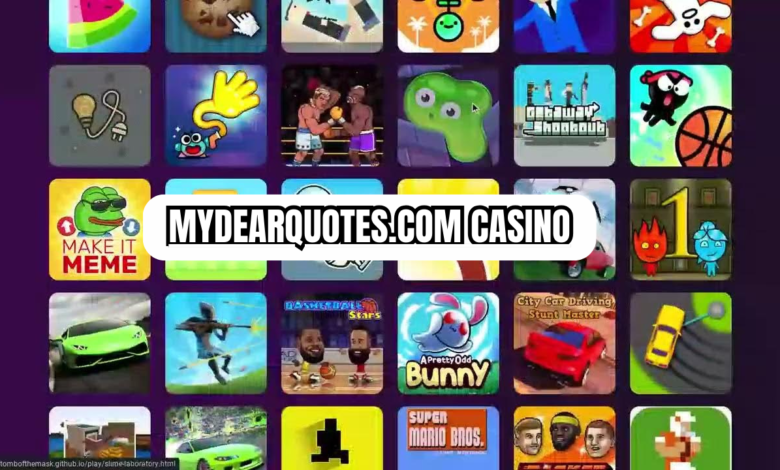GitHub.io Games: The World of Open-Source Browser Gaming

Introduction
What Are GitHub.io Games?
GitHub.io games represent a variety of games hosted on GitHub Pages, a feature that lets developers publish their websites directly from their GitHub repositories. These games cover all genres—from classic platformers and puzzle games to innovative strategy games. Since these games come from open-source projects, players enjoy them for free, while developers have the opportunity to share, learn, and collaborate with each other.
Why Play Games on GitHub.io?
The appeal of GitHub.io games lies in the unique blend of community-driven creativity, open-source philosophy, and accessibility. Here’s what makes these games stand out:
- Free and Accessible: You only need a web browser to play GitHub.io games—no downloads, no subscriptions.
- Open-Source Learning: By exploring these games, developers gain insights into coding practices, game mechanics, and design.
- Diverse Options: GitHub.io games span every genre, style, and complexity level, catering to casual and hardcore gamers alike.
- Support for Independent Developers: Playing GitHub.io games allows you to support indie developers and even contribute to game improvement.
How to Find GitHub.io Games
GitHub hosts thousands of open-source projects, and finding games can sometimes feel overwhelming. Here are some reliable ways to discover quality GitHub.io games:
GitHub Search and Explore Features
GitHub’s search bar lets users find games by typing specific keywords like “game,” “HTML5 game,” or “JavaScript game.” Additionally, GitHub’s Explore feature regularly highlights trending projects, where you may find new and popular games.
Game Jam Projects
Many GitHub.io games stem from Game Jams, events where developers build games within short deadlines. Game Jams encourage experimentation, and their results often get published on GitHub.io, showcasing creative concepts and polished games alike.
Curated Lists and Developer Profiles
Popular GitHub users and repositories sometimes compile lists of recommended GitHub.io games. Following these curators offers a steady stream of games worth checking out, often categorized by genre or popularity.
Popular GitHub.io Games to Try
2048
2048 remains a widely popular GitHub.io game for players seeking an addictive, minimalist puzzle. In 2048, players combine matching number tiles until they reach the 2048 tile or beyond. The game’s simplicity and challenging mechanics have made it a hit, and the code’s open-source availability has led to countless modifications, making each playthrough unique.
Flappy Bird
Based on the viral mobile game, Flappy Bird clones on GitHub.io feature the same frustrating yet entertaining gameplay. Players control a bird, navigating it through pipes by tapping the screen or pressing keys. GitHub.io developers have built numerous variations, each with its own flair and modifications to keep players hooked.
Hextris
Hextris combines elements of Tetris with a hexagonal twist. Players rotate a hexagonal grid, trying to line up blocks of the same color. With its fast pace and unique style, Hextris delivers a refreshing take on traditional Tetris-style games, appealing to puzzle fans and casual players alike.
Pixel Defense
In Pixel Defense, players defend a tower by strategically placing defenses against waves of enemies. The game offers a simplified yet engaging tower defense experience with pixel art and straightforward mechanics. Pixel Defense demonstrates the potential of GitHub.io for developing compelling strategy games, even with basic resources.
Elevator Saga
Elevator Saga stands out as a programming-based game. Players must control an elevator system, optimizing its efficiency as it carries passengers up and down. This game challenges programming enthusiasts to write JavaScript code that improves elevator performance, blending problem-solving with gameplay.
Why Developers Love GitHub.io Games
GitHub.io games allow developers to express creativity, experiment with new ideas, and showcase their work. Here’s why developers find GitHub.io an ideal platform:
Simple Publishing:
GitHub.io simplifies the publishing process, allowing developers to bring their projects to the web effortlessly.
Collaboration Opportunities:
As open-source projects, GitHub.io games welcome contributions from other developers, fostering learning and community support.
Professional Exposure:
Publishing games on GitHub builds an online portfolio, giving developers a way to showcase their skills to potential employers.
Experimentation:
GitHub.io’s flexibility encourages developers to experiment with innovative mechanics and design without commercial constraints.
How to Play GitHub.io Games with Friends
Many GitHub.io games offer multiplayer modes, enabling friends to play together. Some games include online multiplayer functionality, while others offer local co-op. Here’s how to enjoy GitHub.io games with friends:
Online Multiplayer Support:
Some GitHub.io games support real-time online play, allowing friends to join the same game through a link.
Screen Sharing for Co-Op Play:
By using screen-sharing platforms, friends can play single-player games together or take turns to reach higher scores.
Creating Your Own GitHub.io Game
If GitHub.io inspires you, creating a game of your own may be the perfect next step. Here’s a guide to getting started with developing and publishing your own GitHub.io game:
Step 1: Setting Up a GitHub Account and Repository
Create a GitHub account if you don’t have one, then set up a new repository for your game project. Name the repository according to your game’s title or theme.
Step 2: Developing the Game
Use HTML5, CSS, and JavaScript to develop the game, or try game engines like Phaser or p5.js for added functionality. You can start with a simple concept, adding complexity as you grow more comfortable with coding.
Step 3: Publishing on GitHub.io
GitHub Pages allows you to publish directly from your repository. Select the repository settings, activate GitHub Pages, and choose the publishing source to go live.
Step 4: Sharing Your Game with the World
Promote your game on social media, developer forums, and GitHub’s own Explore page. Sharing your game encourages feedback and may even attract contributors to enhance your project.
Benefits of GitHub.io Games for Learning and Growth
GitHub.io games offer a valuable educational resource for aspiring developers. Here’s how engaging with these games fosters learning and professional growth:
Coding Practice:
Developing games improves programming skills, especially for those learning JavaScript, HTML, and CSS.
Problem-Solving Skills:
Players often tackle logic-based puzzles or programming challenges, sharpening problem-solving abilities.
Team Collaboration:
Many GitHub.io projects encourage community contributions, allowing developers to practice collaboration and learn from each other.
Challenges of GitHub.io Games and How to Overcome Them
While GitHub.io offers remarkable potential, developers face some challenges when publishing games:
File Size Limitations:
GitHub restricts file size, which may limit graphics and assets for larger games. By optimizing images and compressing code, developers can create more efficient games that fit GitHub’s limits.
Lack of Monetization:
Since GitHub.io focuses on open-source projects, direct monetization isn’t available. Developers can build a portfolio or accept donations on platforms like Ko-fi or Patreon to gain some revenue.
Security and Privacy:
As public repositories, GitHub.io games require careful handling of sensitive data. Avoid storing personal information or sensitive data within the codebase to protect users’ privacy.
Popular Tools and Frameworks for GitHub.io Game Development
Several frameworks support GitHub.io game development, each offering unique features:
Phaser:
Phaser provides a complete framework for creating 2D games, with robust support for animations and physics.
p5.js:
Ideal for visual games, p5.js simplifies creative coding and offers powerful tools for drawing and animation.
Three.js:
For developers interested in 3D games, Three.js offers extensive resources for building immersive experiences within a browser.
Matter.js:
Matter.js provides a physics engine, enabling developers to create games with realistic physics, ideal for puzzle or action games.
Building a Community Around GitHub.io Games
GitHub.io games encourage community building, allowing developers and players to connect over shared interests. Here’s how developers and gamers contribute to a vibrant GitHub.io gaming community:
Forums and Discussion Boards:
Platforms like Reddit and GitHub Discussions foster a space where developers share tips, players discuss gameplay, and fans discover new projects.
Collaborative Development:
Open-source GitHub.io games welcome contributions, encouraging developers to enhance gameplay, fix bugs, or introduce new features.
Social Media and Streaming:
Gamers often stream GitHub.io games or share highlights on social media, generating interest and feedback for developers.
Conclusion
GitHub.io games offer a remarkable world of creativity, coding, and community. Whether you’re a player seeking fresh and unique browser-based games or a developer interested in building your own gaming projects, GitHub.io brings endless opportunities to explore. From challenging puzzles and retro arcade games to modern strategy titles, GitHub.io’s collection proves that open-source gaming has limitless potential. Embrace the thrill of discovery and dive into GitHub.io games to experience the world of accessible, free, and creative browser gaming.
FAQs
What are Git Hub.io games?
Git Hub.io games are browser-based, open-source games hosted on GitHub Pages, where developers share free games with a focus on learning, creativity, and accessibility.
Can I play Git Hub.io games on my mobile device?
Yes, many Git Hub.io games support mobile browsers, though some games perform better on desktops due to screen size and input requirements.
Are Git Hub.io games safe to play?
Most Git Hub.io games come from open-source projects, making their code visible to the community. However, players should check the developer’s reputation and repository details to ensure reliability.
How can I create my own Git Hub.io game?
You can create your own Git Hub.io game by setting up a GitHub repository, coding the game in HTML5, CSS, and JavaScript, and publishing it through GitHub Pages.
Is there a way to contribute to Git Hub.io games?
Absolutely. Git Hub.io games welcome community contributions, allowing developers to suggest improvements, report bugs, or add new features through pull requests.
What types of games can I find on Git Hub.io?
Git Hub.io games span all genres, including puzzle, action, platformers, and educational programming games.



